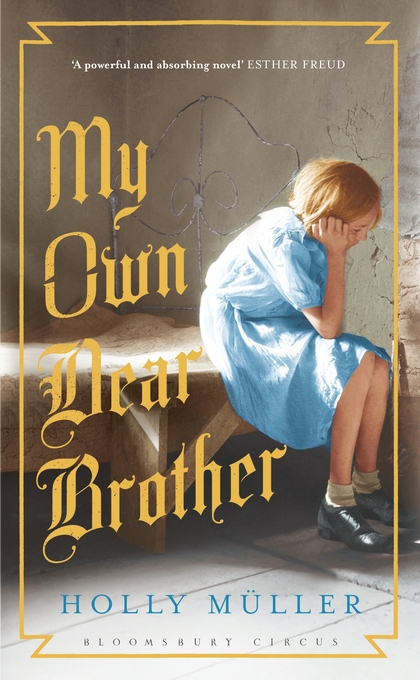Durre Shahwar reviews My Own Dear Brother by Holly Müller a highly impressive debut novel exploring the other side of the Nazi Regime.
Rarely do we read novels that tell the story from the other side of the Nazi Regime. And when we do, rarely do we expect them to evoke as much empathy, fear and attachment towards the characters as does Holly Müller’s debut novel, My Own Dear Brother (2016). Set near the end of the Second World War, the novel follows the life of 13-year-old Ursula Hildesheim in the village of Felddorf. With Austria under Nazi control, and the men away to fight at the front line, Ursula is left behind in the rural village with her mother, sister and brother, Anton, whom she much dotes upon.
During the war, life in Felddorf is as normal as it can be. But Russian prisoners escape from a nearby concentration camp, one of which Anton shoots, and the incident becomes a symbolic mark for the beginning of change and the domino effect of events that follow. The school closes, questions of loyalty arise, and Ursula embarks on a challenging and dark journey towards becoming a young woman through the loss of innocence during the war. She also befriends Schosi Hillier, a young boy with a learning disability, who grows attached to her, whom Anton hugely dislikes. Yet Ursula has a blind spot when it comes to Anton, a member of the Hitler Youth, whose cruel and violent nature towards Schosi increases as the novel progresses, causing a rift in their relationship.
Müller’s characters are very real and multi-dimensional. As a protagonist, Ursula is rebellious and headstrong. She commits petty theft, roams the village, and adamantly accompanies Herr Esterbauer on a mission to rescue Schosi after he is taken to the Hartburg hospital, infamous for its horrific ‘treatments’ and torture towards disabled and mentally ill children during the war. Schosi’s character becomes an embodiment of vulnerable children who suffered and died at the hands of the inhumane. Müller unflinchingly withholds nothing when describing Schosi’s and other children’s experiences at the hospital.
My Own Dear Brother also contains elements of Austrian folklore. Many of the characters embody Krampus, a menacing folklore figure, who appears at Christmas to punish children who have misbehaved. The themes of fear and the impact of the war on young children is a major one, which reminds the reader of the Kindertransport stories; Müller seems to want to tell the story of the children that could not so easily escape the Regime from a new perspective. Her technique of narrating indirectly from the point of the view of the innocent, be it at the hospital or when the Russians invade the village, raping young girls and women, is highly effective. It is not so much that the novel aims for the ‘shock factor’, but to depict the realities of the time as they were. The realities of the way the war tore apart small families and villages, turned neighbours against one another, and how families still had to go to work and somehow put food on the table every evening.
Müller captures the ‘small village mentality’ perfectly; people gossip, Ursula’s family is shunned out of church once her mother starts an affair with a married man, they are looked down upon due to their poor clothes, their shoeless feet. Müller depicts how Hitler’s regime and control filtered down even on a smaller level; no one could be trusted to keep a secret. The novel is filled with tension and suspense; there is a constant threat and danger to life. It shows how the most unimaginable and harrowing situations were adapted to for the sake of survival, such as when the Russians invade the village and the Hildesheims are forced to play house with many of the officers. It gets to the point that the reader questions which authority was the better of two evils.
While war frames the novel, the themes of love, loyalty, and courage dominate it. It is not so much about the war as it is about coming of age in such a time. There are glimmers of hope, despite the psychological trauma and heartbreak. If there is a weak spot then it is that the mystery behind Anton and Ursula’s tightly knit relationship is too predictable. Yet, despite being ‘historical fiction’, My Own Dear Brother offers a refreshingly new perspective and has an immediacy of the present to it. Split into three subsequent parts, the plot is authentic, instantly gripping and fast-paced. 455 pages are usually a daunting read, but Holly Müller has a skill for making each page count and being significant to the overall story.
Müller herself has Austrian roots, which no doubt influenced and informed the intense research behind the story. Part of that research was undertaken in Vienna, and that, combined with her tremendous imagination and poetic style of writing, makes My Own Dear Brother a highly impressive debut.
Durre Shahwar is a contributor and assistant editor at Wales Arts Review.











